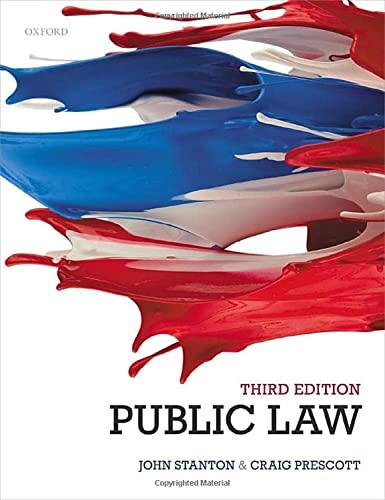Question
The beneficiaries of a decedent are paid prior to debts. Group of answer choices True False Flag question: Question 12 Question 12 1pts A trustee
The beneficiaries of a decedent are paid prior to debts.
Group of answer choices
True
False
Flag question: Question 12
Question 12
1pts
A trustee can delegate the performance of personal duties.
Group of answer choices
True
False
Flag question: Question 13
Question 13
1pts
The theories of product liability
Group of answer choices
are mutually exclusive.
are set forth exclusively in the common law.
are not mutually exclusive.
are set forth exclusively in the UCC.
Flag question: Question 14
Question 14
1pts
A corporation may be judicially dissolved when its management is deadlocked and the deadlock cannot be broken by the shareholders.
Group of answer choices
True
False
Flag question: Question 15
Question 15
1pts
A debtor is presumed to be insolvent on and during what number of days immediately preceding the date of the filing of a bankruptcy petition?
Group of answer choices
30
120
60
90
Flag question: Question 16
Question 16
1pts
A corporation may properly exist without a name.
Group of answer choices
True
False
Flag question: Question 17
Question 17
1pts
State intestacy statutes commonly provide for distribution in the following order: __________.
Group of answer choices
spouse,lineals, parents, collateral heirs.
spouse, lineals, collateral heirs, parents.
spouse, lineals, collateral heirs, parents.
spouse, parents, lineals, collateral heirs.
Flag question: Question 18
Question 18
1pts
Thebalance sheet testis merely a comparison of assets to liabilities without considering whether the debtor will be able to meet future obligations as they become due.
Group of answer choices
True
False
Flag question: Question 19
Question 19
1pts
Where a testatrix executes a will and later has a child: __________.
Group of answer choices
many states hold that the will of the testatrix is partially revoked by operation of law to provide a share to the after-born child.
a new will must be executed because the birth voids the original will.
the child is prohibited by law from receiving anything from the estate.
the after-born child takes a share by escheat.
Flag question: Question 20
Question 20
1pts
When a person dies with a will, usually the probate judge names who the administrator of the estate.
Group of answer choices
True
False
Step by Step Solution
There are 3 Steps involved in it
Step: 1

Get Instant Access to Expert-Tailored Solutions
See step-by-step solutions with expert insights and AI powered tools for academic success
Step: 2

Step: 3

Ace Your Homework with AI
Get the answers you need in no time with our AI-driven, step-by-step assistance
Get Started


